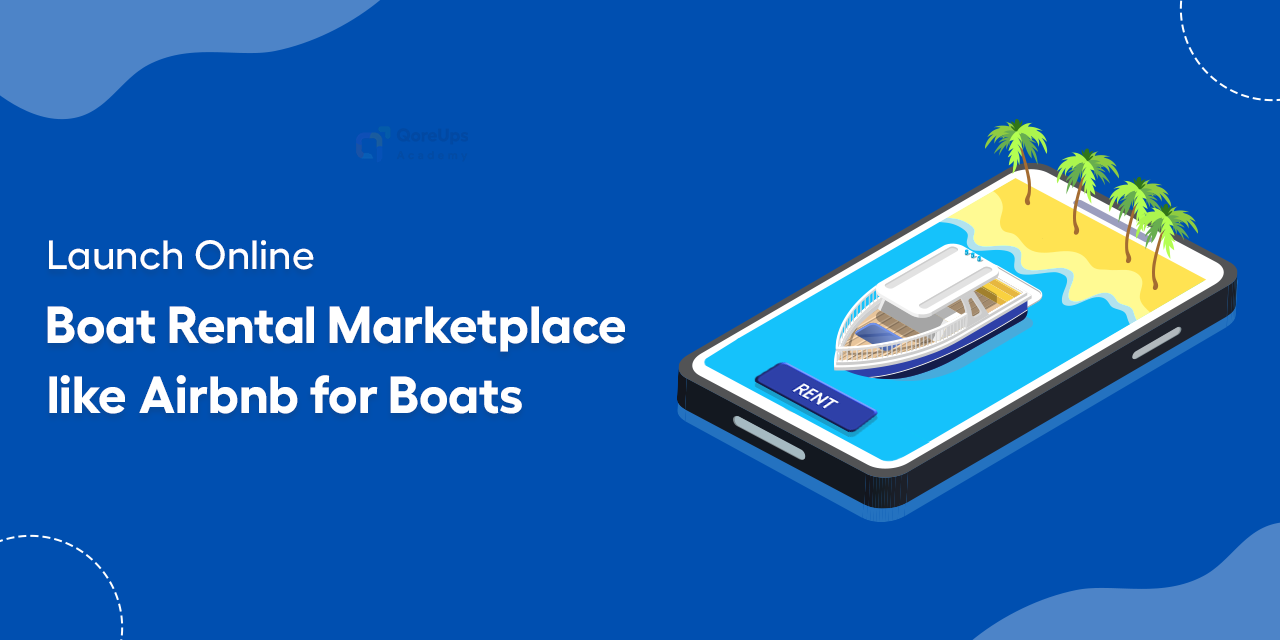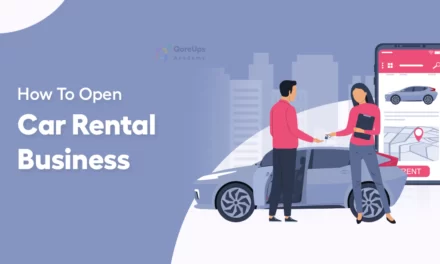The sharing economy is transforming industries left and right. And the boat rental world is next.
With a rising demand for unique travel & adventure experiences, launching a boat rental marketplace is your great chance to dive into this booming sharing economy.
This marketplace model brings together people who own boats with those who want to rent them.
Are you looking to launch your own marketplace like Airbnb for boats?
This guide will walk you through everything you need to know.
What is a Boat Rental Marketplace?
A boat rental marketplace is an online hub (website or app) that connects boat owners with renters.
Yes, you’re right! It’s much like Airbnb does with homes.
A boat rental marketplace allows individuals to list boats for short-term use. Renters can discover and book various types of watercraft, from yachts and sailboats to fishing boats and jet skis, available at different locations and prices.
These platforms can function in these models:
- Peer-to-Peer (individuals renting boats from individuals)
- Business-to-Consumer (boat rental companies listing their fleet)
Either way, the marketplace is capable of handling bookings, payments, communication, and sometimes even insurance.
And this model is often referred to as a “boat rental marketplace like Airbnb for boats” because it uses the same user-driven, trust-based system that made Airbnb successful.
With the concept clear, it’s time to look at the real potential of the boat rental industry. Just how big is the opportunity this industry has? Let’s dive into the numbers and trends driving this wave.
Market Opportunity and Emerging Trends in the Boat Rental Industry
The global recreational boat rental market is sailing strong. Here are the reasons why this is the perfect time to launch your marketplace:
📈 Market Opportunity in the Boat Rental Industry
The boat rental market is set for impressive growth. According to MRFR Analysis, the market is expected to reach $32.23 billion by 2034, growing at a CAGR of 6.10% from 2025 to 2034.
This growth is driven by the expansion of global marine tourism, rising disposable incomes, the rise of online rental platforms, and a shift toward sustainable boating.
Demand is highest in coastal and lakeside areas, where many tourists want to enjoy fun activities on the water.
As more people look for easy ways to enjoy boating, online marketplaces that connect boat owners with renters are in a prime position to meet this demand. This rising interest highlights a bright future for entrepreneurs ready to launch a boat rental marketplace.
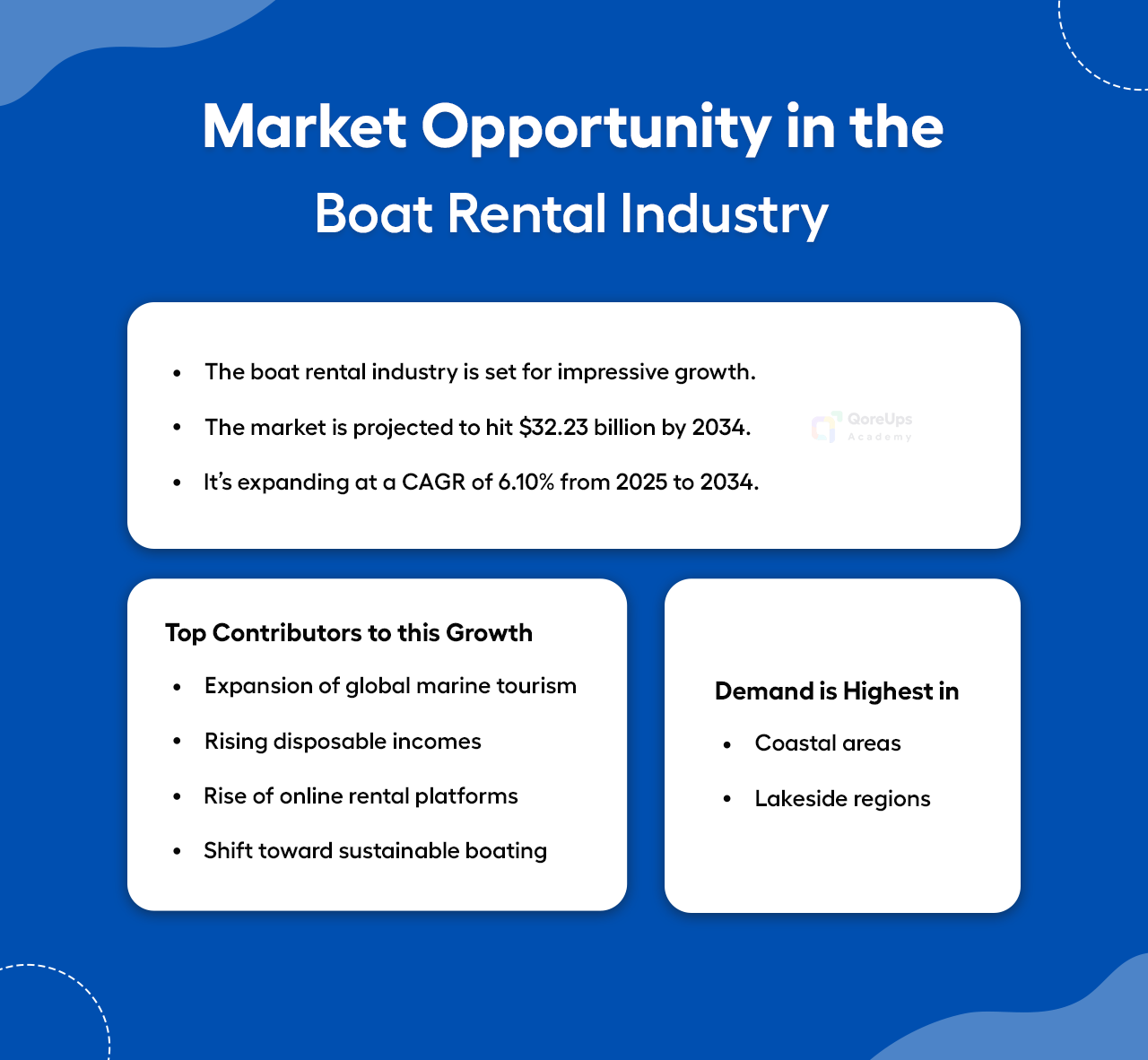
Emerging Trends in the Boat Rental Industry
Growing Demand for Experiences: Millennials and Gen Z value experiences over ownership. Renting a boat for a weekend getaway fits this mindset perfectly.
Digital Transformation: Users today demand digital access that allows them to easily search, compare, and book boats anytime and anywhere without the need to make phone calls or in-person visits.
Eco-Conscious Trends: By promoting the sharing of boats rather than individual ownership, boat rental marketplaces help reduce the demand for manufacturing new vessels, which in turn lowers the environmental impact associated with production, resource extraction, and waste.
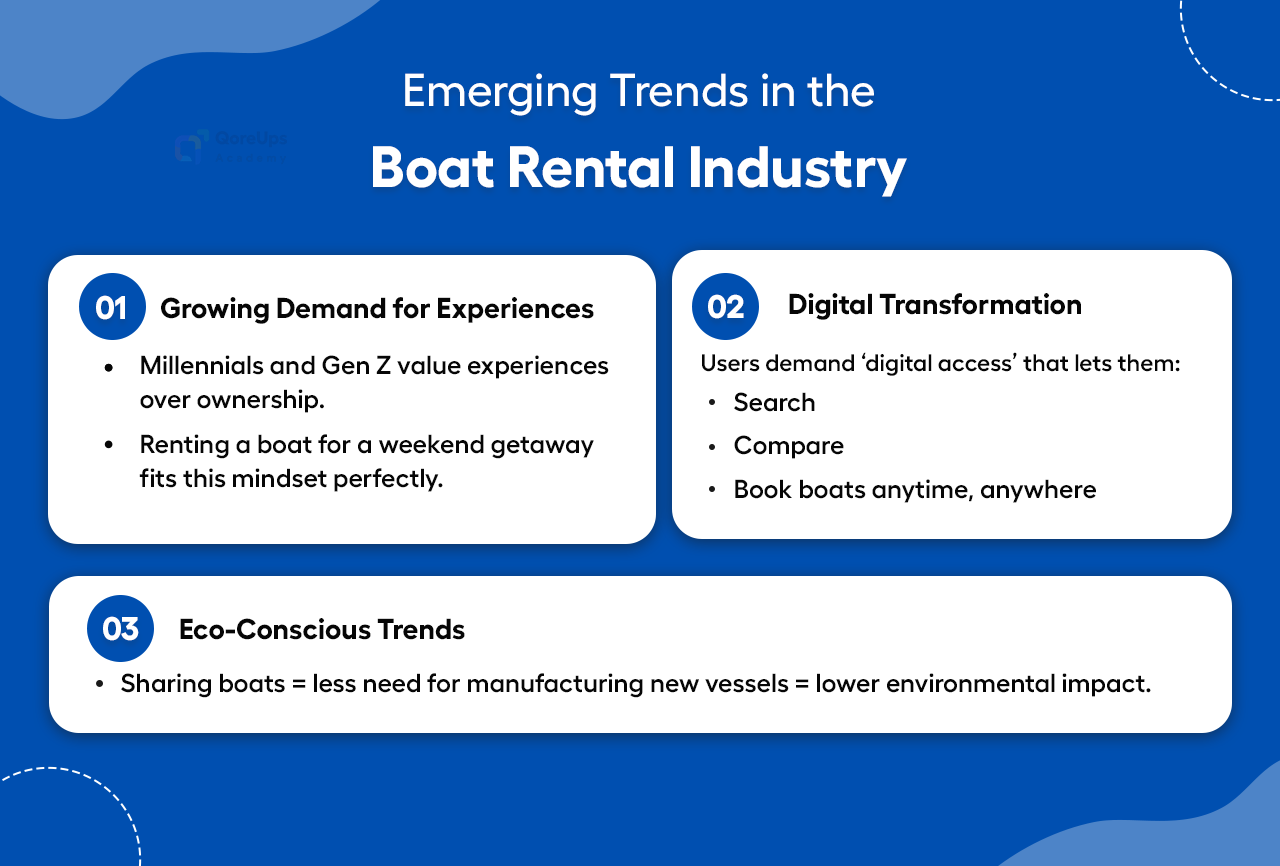
If you want to get the latest trends and valid market updates in the boat rental industry, subscribe to our blog!
Features Needed for Your Online Boat Rental Marketplace
Here is the list of several essential features you’ll need to include in your boat rental marketplace to ensure an enjoyable experience for both boat owners and renters:
Features For Renters
To keep renters happy, your platform should be easy to use. Here are the important features renters expect:
- Search & Filter: Your platform should let users quickly find boats by location, type, price, and availability.
- Detailed Listings: Each listing needs clear details like boat description, capacity, photos, and reviews.
- Efficient Booking System: A booking system with an availability calendar and options for instant reservation helps renters plan their trips.
- Secure Payments: Offering trusted payment gateways ensures users can pay safely and easily.
- Chat & Support: Real-time chat and customer support keep communication flowing and help solve any issues.
- Ratings & Reviews: Let users share feedback to build trust for everyone on the platform.
Features For Boat Owners
For boat owners, your platform should offer easy tools to list and manage their boats. Key features include:
- Listings Management: Boat owners need an easy way to upload detailed information about their boats and control when their boats are available for rent.
- Earnings Dashboard: Owners want a clear dashboard to track their bookings, see upcoming reservations, and monitor payouts and total earnings—all in one place.
- Insurance Integration: Offering optional insurance during rentals gives boat owners extra protection and peace of mind, making them feel more comfortable sharing their boats.
- Document Upload: Boat owners should be able to securely upload important documents like boat registration, certifications, and licenses to comply with legal and safety requirements.
Features for Admins
The admin panel needs these robust features to help keep your boat rental marketplace running smoothly:
- User Management: The admin needs tools to manage both boat owners and renters, approving new users, handling profiles, and ensuring everyone follows the platform rules.
- Commission & Fees Settings: Admins should be able to set and adjust commission rates and fees, controlling how the platform makes money from bookings.
- Dispute Management: A system to handle conflicts or issues between renters and boat owners, helping resolve problems quickly and fairly.
- Analytics Dashboard: An effective dashboard for business growth that shows key data like total bookings, revenue, user activity, and growth trends to help admins make smart decisions.
To succeed, your platform must include features that make renting and managing boats simple and trustworthy for all users.
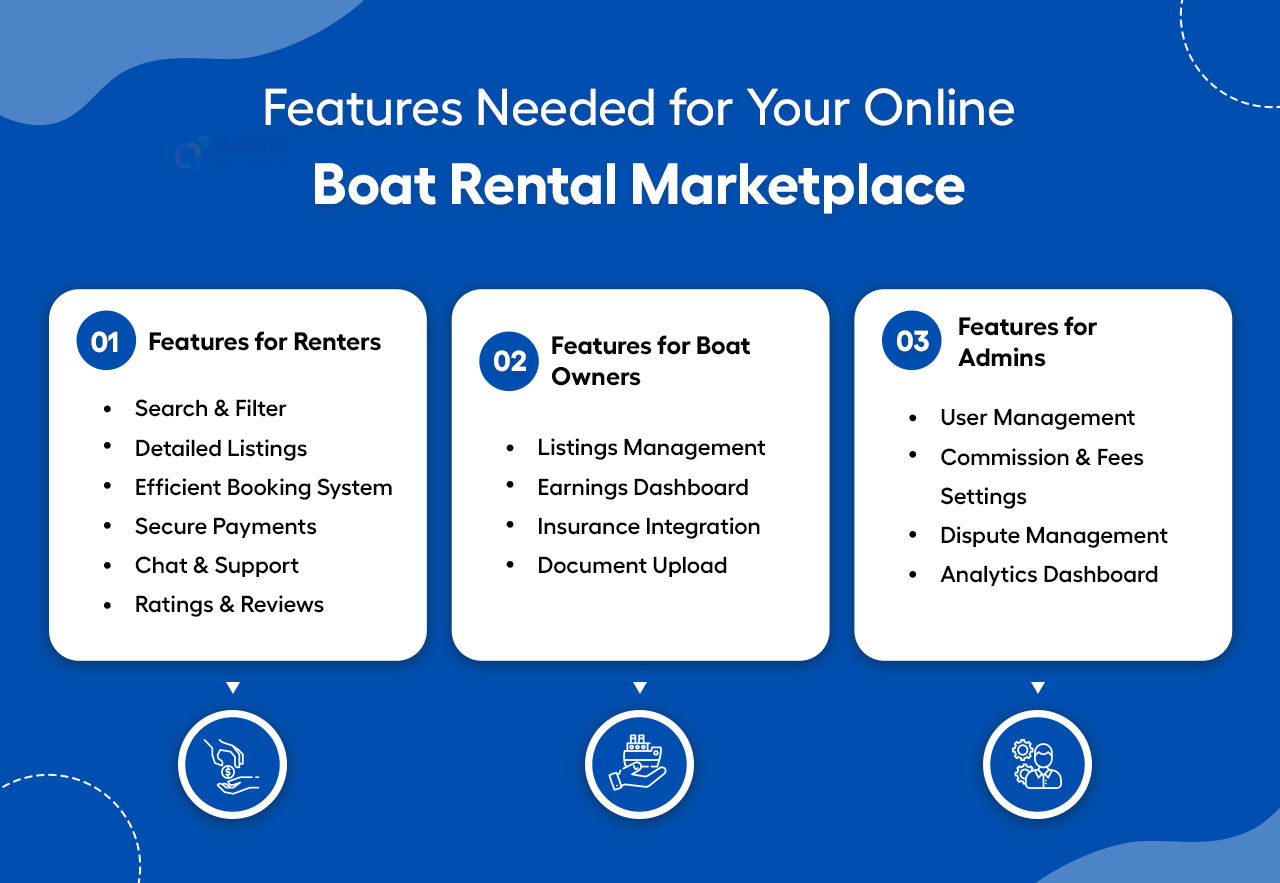
Building Your Boat Rental Marketplace Like Airbnb For Boats
💡 Pro Tip: Think like a traveler, build like a host.
Creating a successful Airbnb clone for boats isn’t just about launching a website—it’s about building a full ecosystem that earns trust, solves real user problems, and grows over time. Here’s how to do it step by step:
1. Market Research: Know Your Waters Before You Sail
Before anything else, figure out who you’re building this for.
- Are you targeting luxury yacht renters in coastal cities?
- Families looking for fun day trips on lakes?
- Tourists looking for fishing boats or paddleboards?
Narrowing your focus helps you serve a specific group better and compete more effectively.
💡 Tips:
- Study competitors like GetMyBoat, Boatsetter, or Click&Boat.
- Interview boat owners and renters in your target area.
- Look for gaps: Is there a region underserved? A type of boat in high demand but short supply?
2. Select Your Tech Stack: Build It Right From Day One
Decide how you’ll develop your platform.
You have two main options:
- Custom Development: Ideal for long-term scalability and unique features. You’ll need a developer or agency.
- No-Code Platforms: Great option for budget-friendly development and quick launches.
⚙️ Tech Must-Haves:
1. Booking Engine
- Calendly (API for scheduling logic) – Great for basic booking flow logic.
- Checkfront – A full booking system that can be integrated with custom platforms.
- Amelia (for WordPress) – Powerful booking plugin, great for MVPs or low-code solutions.
- Custom calendar logic – If building from scratch, use libraries like FullCalendar with custom integrations.
2. Payment Integration
- Stripe – Most flexible and developer-friendly option for handling payments, subscriptions, and refunds.
- PayPal – Globally trusted and ideal for giving users more payment options.
- Razorpay – A good alternative in India and Southeast Asia.
- Mollie – Great for European markets and supports multiple payment methods.
3. Secure Database
- Firebase Firestore – Scalable, easy to use, with built-in security rules.
- MongoDB Atlas – Flexible, great for document-based data (like listings and user profiles).
- PostgreSQL – Reliable and powerful for relational data, often used with custom backends.
- Supabase – A Firebase alternative with open-source roots and PostgreSQL support.
4. Scalable Backend
- Firebase – All-in-one backend solution with authentication, database, and hosting.
- AWS (Amazon Web Services) – Industry-standard for scalability and performance. Use AWS Lambda, EC2, and S3 as needed.
- Heroku – Easiest for deploying smaller apps quickly.
- Vercel or Netlify – Great for front-end hosting + connecting to APIs.
5. Mobile Optimization
- React Native – Build native mobile apps for iOS and Android with one codebase.
- Flutter – Google’s toolkit for high-performance, cross-platform mobile apps.
- Responsive Web Design – Use frameworks like Tailwind CSS, Bootstrap, or Media Queries to ensure your site looks great on all devices.
- Lighthouse (by Google) – Free tool to audit mobile performance, speed, and best practices.
3. Design UX/UI: Make It Feel Effortless
A clean, easy-to-use interface can make or break your platform. Renters should feel confident, and boat owners should find it simple to manage their listings.
🔍 Focus on:
- Mobile-first design: Most users will browse and book on their phones.
- Clear CTAs: Buttons like “Book Now,” “Message Owner,” or “List Your Boat” should be visible.
- Minimal clicks to book: Users shouldn’t have to click through too many steps to reserve a boat.
💬 “Design isn’t just how it looks—it’s how it works.”
Want expert’s smart strategies to build your boat rental marketplace? – Join our academy for FREE!
4. Develop Features: Build What Matters First
Don’t build everything at once.
Start with the core features for renters and owners (listed earlier) and add more as your user base grows.
📍 Start with:
- Listings and profiles
- Booking calendar
- Payment gateway
- Messaging
- Reviews
- Admin controls
- As you grow, add:
- Loyalty programs
- Trip insurance
- Geolocation search
- Multi-language and multi-currency support
5. Testing: Ensure It’s Smooth Sailing
Before launch, test everything thoroughly to avoid user frustration.
What to test:
- Bugs & Errors: Broken links, buttons, or forms.
- Payment Flows: Ensure transactions are processed correctly.
- Mobile Responsiveness: Check on phones, tablets, and desktops.
- Security: Protect user data with SSL, encrypted passwords, and secure databases.
Use testing tools like:
- BrowserStack (for device testing)
- Stripe test mode (for payment)
- UserTesting or friends/family feedback
6. Launch: Start Small, Then Expand
Instead of launching globally, do a soft launch in one location, like a specific lake town or coastal city.
🤔 Why Start Small?
- Easier to test and fix issues.
- Build a strong user base and collect early reviews.
- You can focus your marketing budget on one area.
Once stable, scale region by region, expand your listings, and improve features based on user feedback.
“Start local. Win local. Then grow global.”
Careful planning, research, and step-by-step development are essential to create a reliable boat rental marketplace.
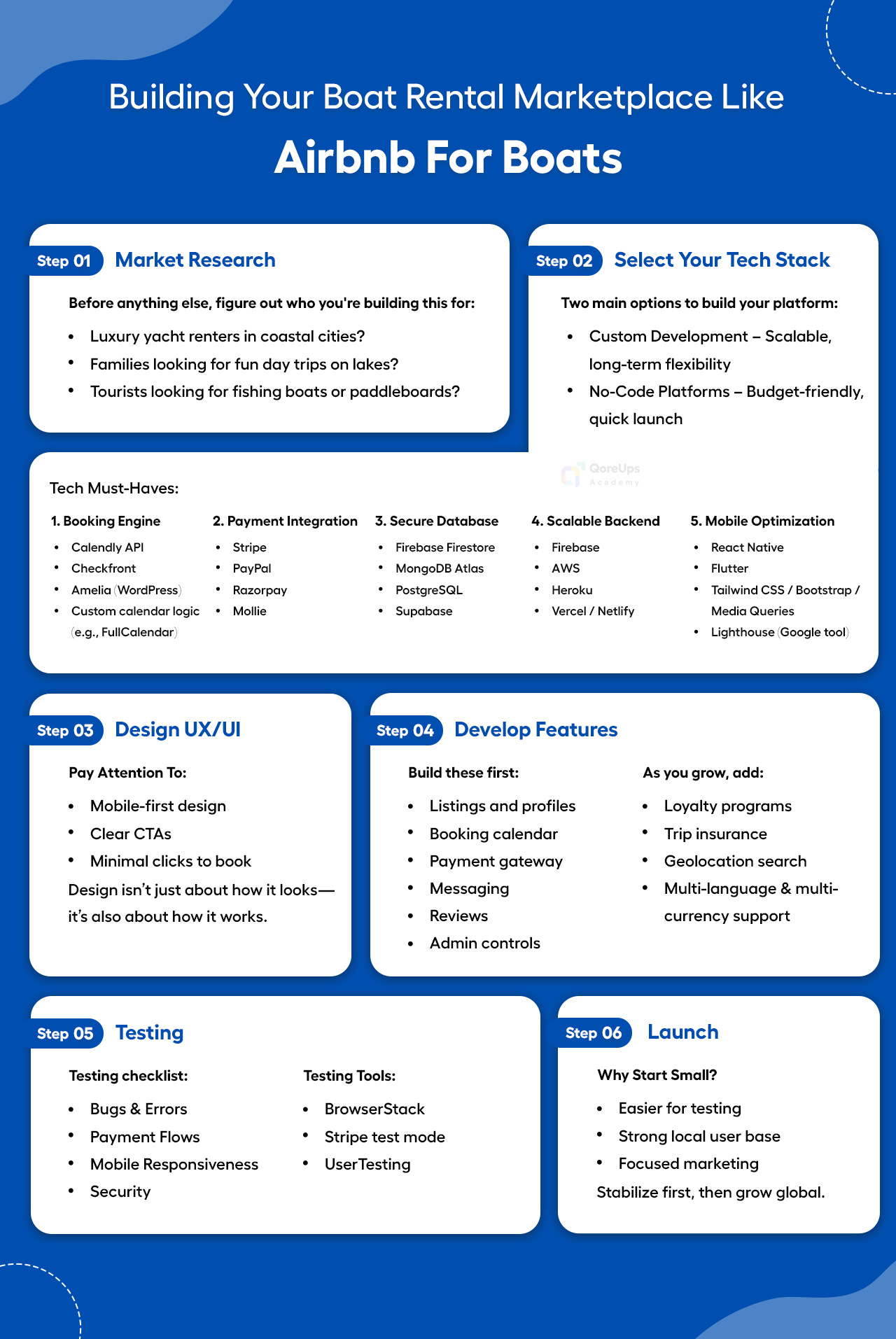
Complying With Boat Rental Laws, Insurance & Regulations
Boating and other water-based activities involve certain risks, which is why they’re often regulated by local and national authorities. It’s important to ensure your platform and its users comply with all the necessary regulations. This helps protect everyone involved – boat owners, renters, and your business.
1. Licensing & Registration
All boats listed on your platform should be legally registered and licensed according to local maritime laws. Each region has its own rules—some may require registration numbers to be displayed on the boat, while others might need yearly renewals or inspections.
✅ What to do
- Require boat owners to upload proof of registration during onboarding.
- Include automatic reminders for registration renewals.
- Verify documents manually or use third-party verification services.
2. Insurance
Accidents happen. Insurance is your safety net. Not all personal boat insurance covers rentals, so it’s vital to offer proper marine rental insurance.
✅ Options include
- Partnering with marine insurers like BoatUS, Pantaenius, or Lloyd’s of London.
- Offering short-term coverage add-ons at checkout for renters.
- Requiring proof of commercial liability insurance from owners.
💡 Helpful Tip: Display an “Insured” badge on listings to boost renter confidence.
3. Safety Regulations
Each rental boat should meet basic safety standards, regardless of location. This includes life jackets, fire extinguishers, emergency signals, and clear operating instructions.
✅ What to include
- A safety checklist for owners during listing setup.
- In-app instructions or quick safety tutorials for renters before departure.
- Option to upload recent safety inspection reports.
💡 Helpful Tip: Create a “Safety Briefing” video that users must watch before their first rental.
4. Age & License Restrictions
In many areas, renters need to meet certain age and licensing requirements, especially for motorboats, jet skis, or sailing yachts.
✅ To manage this
- Ask renters to enter their age and boating license number during signup or booking.
- Block rentals for certain boats if the criteria aren’t met.
- Verify licenses manually or use tools like Onfido or Jumio for ID checks.
📌 Final Note on Complying With Laws & Regulations
Regulations vary by country, state, and even by marina. Working with a maritime legal consultant or insurance partner can help you stay ahead of compliance challenges.
Ensuring your platform meets all legal, safety, and insurance requirements protects your users and builds trust in your marketplace.
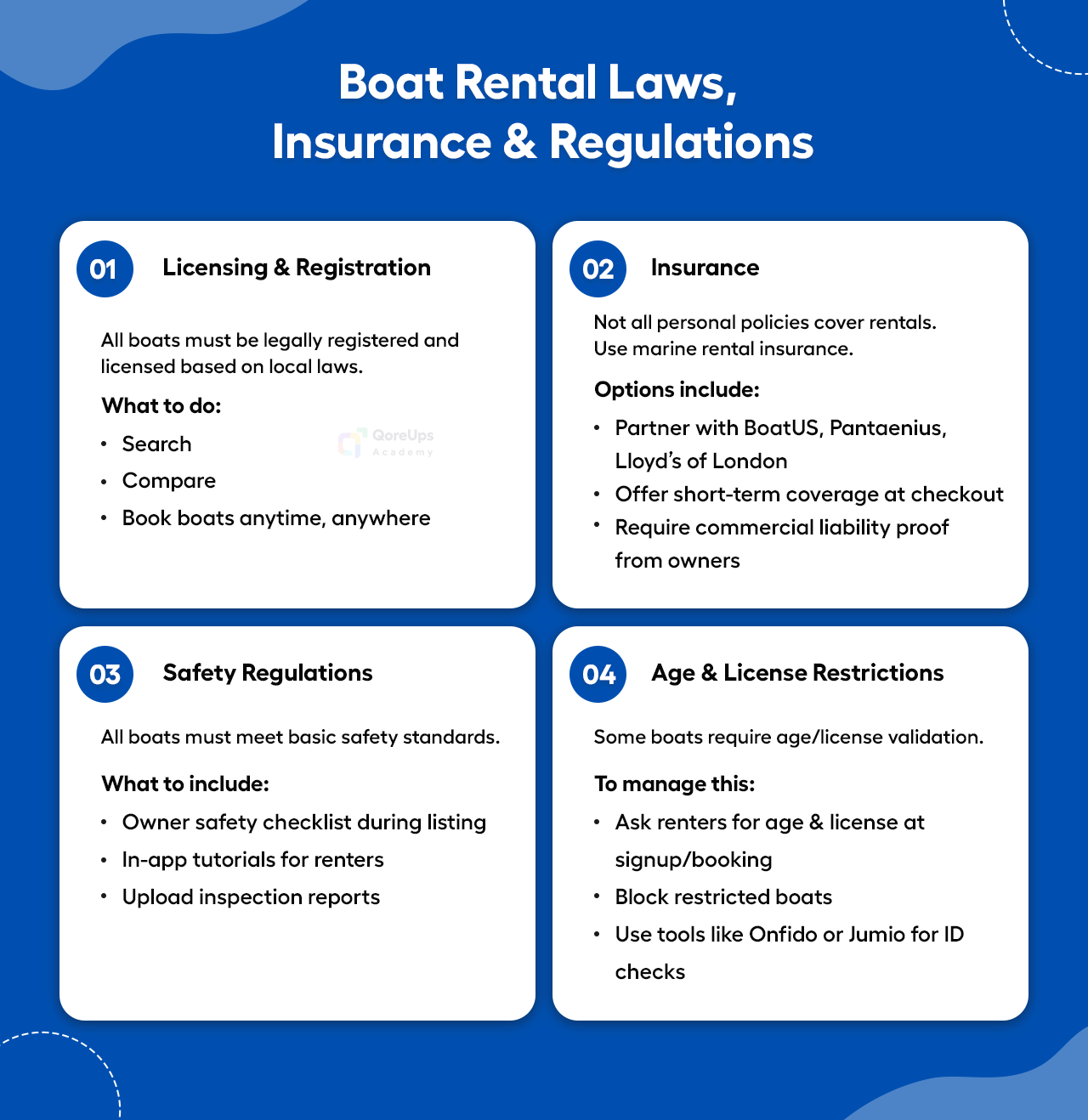
Money Making Strategies for Your Boat Rental Marketplace
To build a successful boat rental marketplace, you need a clear plan for how your platform will make money. Here are some common ways marketplaces generate revenue:
1. Commission-Based Model
This is the most popular method.
Every time a boat rental is booked, your platform takes a small percentage (or commission) from the total payment.
Think of it like Airbnb—your platform earns money only when a booking happens, making it low risk for boat owners.
2. Subscription-Based Model
In this model, boat owners pay a fixed monthly or yearly fee to list their boats on your platform.
This gives you a steady income. And it encourages owners to keep their listings active and updated.
Don’t Miss Out on the Latest Marketplace Tips – Join QoreUps Academy!
3. Freemium Model
Here, basic boat listings are free to add. But owners can pay for premium features like better visibility, promotion, or insurance packages.
This approach lets you attract more owners at first while offering added value for a fee.
4. Hybrid Model
You can also combine multiple revenue models to create flexibility.
For example, charge a smaller commission on bookings and offer premium plans for owners who want extra perks. You could also add advertising and partner promotions as additional revenue streams.
💡 Success Tip: It’s smart to start with a simple commission-based model since it’s easy to manage and popular with users. As your platform grows and you better understand your market, you can experiment with other revenue streams to maximize profits.
If you need, take a look at Airbnb revenue streams to get some monetization inspiration.
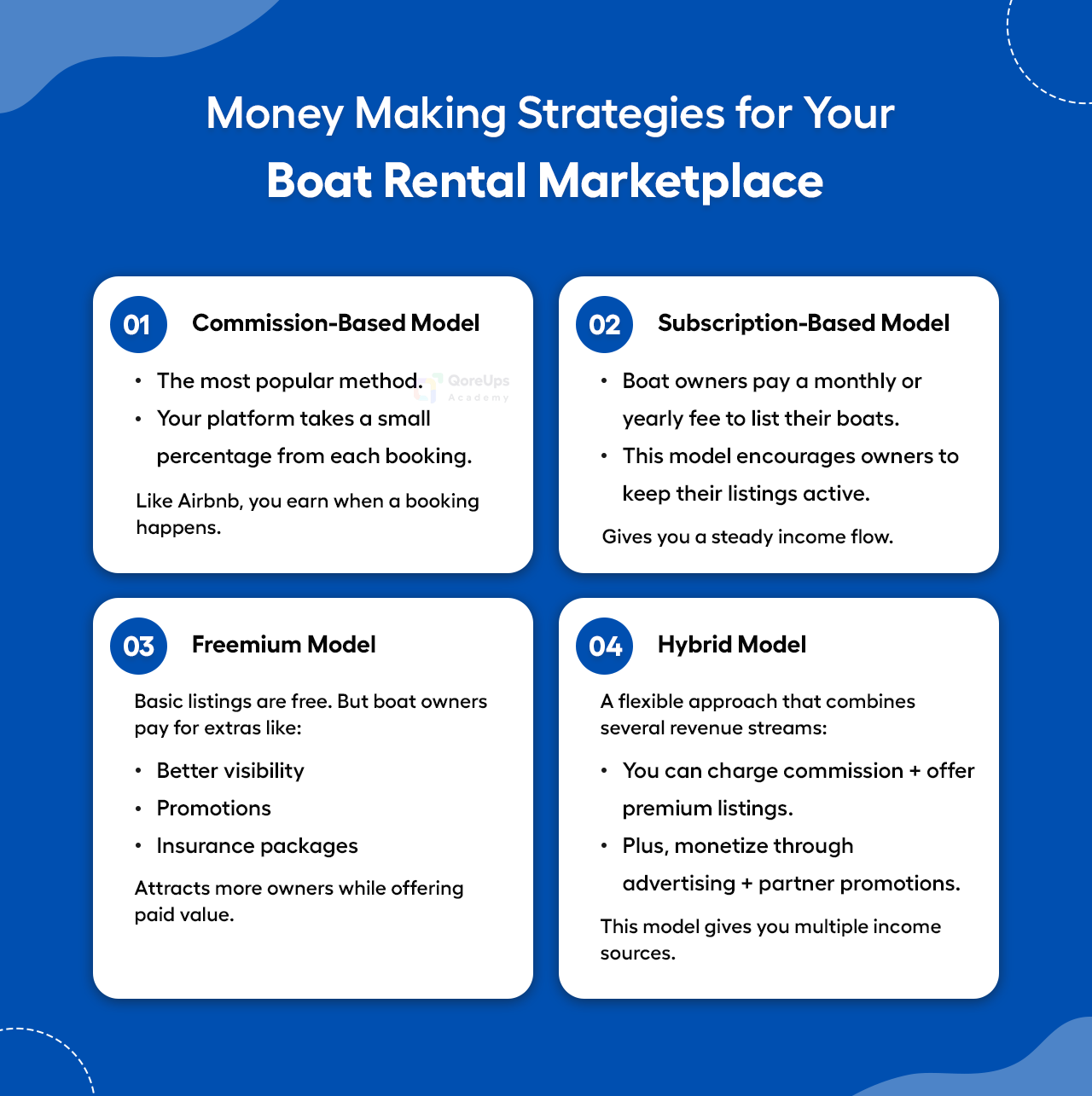
Final Thoughts
The future of travel is all about experiences—people want unique adventures that create lasting memories. Boat rentals perfectly combine the thrill of exploration with the calm of relaxation on the water, making them an exciting option for travelers.
If you build an online boat rental marketplace like Airbnb for boats with the right plan, useful features, and by following all the necessary laws, you could create a platform that has huge potential to become a major player in the growing sharing economy.
So, the question is: The sea is calling. Are you ready to build the platform that answers and helps people discover the joy of boating?
FAQs
Q: What is a boat rental marketplace like Airbnb for boats?
It’s a boat rental business model that works exactly like Airbnb but for renting boats instead of homes. That’s why it’s often referred to as an Airbnb clone tailored for the maritime world.
Q: How much does it cost to build a boat rental marketplace like Airbnb for boats?
A basic MVP can cost $10,000–$30,000. Custom, feature-rich platforms can go up to $100,000+, depending on complexity.
Q: Do I need to own boats to start?
A: No, you don’t need to own any boats to start a boat rental marketplace, just like Airbnb doesn’t own the homes listed on its platform. Your role is to create a trusted platform that connects boat owners with people who want to rent them. Think of yourself as the bridge between supply (boat owners) and demand (renters).
Q: What are the key revenue models for an online boat rental marketplace?
A: There are several proven ways to generate revenue from a boat rental platform. Here are the most common models:
- Commission-Based Model
- Subscription Model
- Freemium Model
- Insurance or Add-On Services
- Advertising & Partner Promotions
Q: Can I operate globally?
A: Yes, you can operate a boat rental marketplace globally. But it’s smart to start local.
Launching in one city or region first allows you to focus your marketing, fine-tune your platform, and build trust with early users. This approach follows the same path as the Airbnb global marketing strategy, which began by targeting a few key cities and gradually expanded worldwide.

